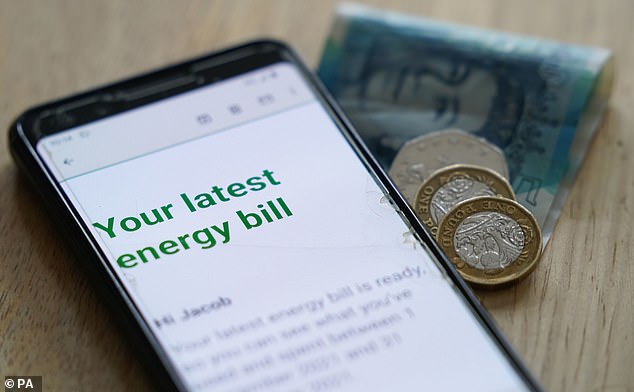- FSB claims suppliers have hiked standing charges for small businesses
- One small business is paying nearly £10 a day in fixed fees
- Have your standing charges increased? Get in touch: editor@thisismoney.co.uk
Small firms are facing crippling increases in standing charges on their energy bills, according to the industry trade body.
The Federation of Small Businesses (FSB) claimed some suppliers were hiking standing charges ‘as a way to inflate bills for small firms’.
Standing charges are a fixed fee that is paid regardless of how much energy you use to help with operational costs.

Small firms have accused suppliers of increasing standing charges in their energy bill
They have come under increased scrutiny because of increasing fees and customers’ inability to cut the price of their bills.
The energy regulator Ofgem opened a consultation on standing charges at the end of last year, asking households and businesses for their views on the fees.
A typical household pays 53p a day for electricity and 30p a day for gas, which is currently capped, but businesses are facing much steeper prices.
The FSB has flagged complaints from its members about huge rises in the fixed fee, with no means to change the ‘stealth charges’ that are driving up their bills.
An auto parts business in Dorset which was paying 70p standing charges per day in July 2021, has had their standing charge increased 12 times and now pays £9.69 per day.
Another firm in the Highlands saw its standing charges climb from 32p to £7.50, adding £2,500 to their annual bill.
It comes just days after FSB research showed utilities were once again the most commonly-cited cause of rising cost pressures.
FSB National Chair Martin McTague said: ‘Energy suppliers have some explaining to do on the sudden and dramatic hikes in standing charges, which become a regressive form of billing that hamper small business growth, confidence, and investment.
‘Even now that the wholesale energy prices have come down from the peak we saw in 2022, small businesses are still scratching their head over skyrocketing bills.’
The lobby group is calling on greater transparency from suppliers on how they calculate the fixed fees, and to narrow the gap between charges for businesses in rural and urban areas.
As well as operational costs, standing charges also incorporate costs related to energy supplier failure and acquisition from suppliers taking on failed businesses under the Supplier of Last Resort (SOLR) regime.
The FSB has called on these costs to be excluded entirely because they ‘only directly benefit the profits of larger energy suppliers’.
McTague said: ‘Small firms do not have the same protection as household customers when it comes to energy price hikes. Business energy bills could continue to stay high if the standing charges system remains the way it is now.
‘A more transparent standing charges system is needed to ensure market competition and, most importantly, to enable small business customers to understand clearly what they are paying for.’
It comes just months after energy suppliers were accused of paying secret commissions to third-party energy brokers.
Last summer, law firm Harcus Parker launched a £2billion claim against energy firms, claiming businesses and other organisations, including care homes and charities, had unknowingly paid over the odds for energy as prices soared.








